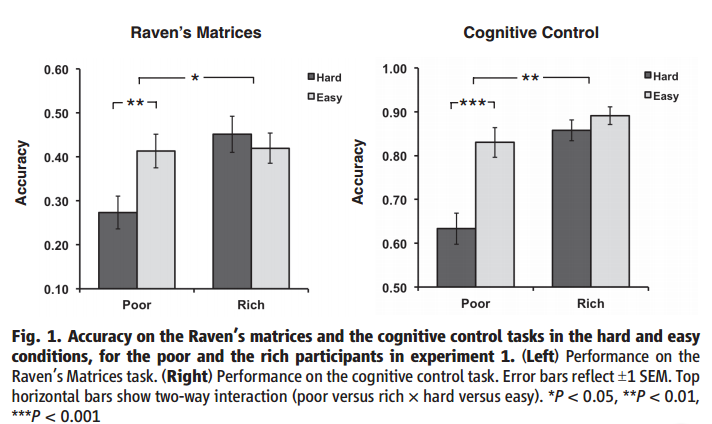批判サイド>関連ネタ
「まさに貧困であるというコンテキストが負荷となって、それが認知能力を損なっっていて、結果として、不適切な判断をしてしまう」ことを実験的に示した研究がある。

Mani et al(2013)は、まずニュージャージー州のショッピングモールの買物客から被験者を募集した。
つづいて...
したがって...
「まさに貧困であるというコンテキストが負荷となって、それが認知能力を損なっっていて、結果として、不適切な判断をしてしまう」ことを実験的に示した研究がある。
Burden of Poverty (貧困の重荷)
Lacking money or time can lead one to make poorer decisions, possibly because poverty imposes a cognitive load that saps attention and reduces effort. Mani et al. (p. 976; see the Perspective by Vohs) gathered evidence from shoppers in a New Jersey mall and from farmers in Tamil Nadu, India. They found that considering a projected financial decision, such as how to pay for a car repair, affects people's performance on unrelated spatial and reasoning tasks. Lower-income individuals performed poorly if the repairs were expensive but did fine if the cost was low, whereas higher-income individuals performed well in both conditions, as if the projected financial burden imposed no cognitive pressure. Similarly, the sugarcane farmers from Tamil Nadu performed these tasks better after harvest than before.
お金や時間がないと、人は不適切な判断をしてしまうことがある。これは、貧困が認知負荷となって、注意力を奪い、努力をできなくするからだと思われる。Mani et alはニュージャージ州のショッピングモールの買い物客と、インドのタミルナズの農民を被験者にして、証拠を集めた。そして、車の修理代をどう払うかといった、予期される金銭判断を考えることが、人々の、それと無関係な、空間タスクや推論タスクの成績に影響することを発見した。低所得者は修理代が高いと成績が悪くなったが、修理代が安い場合は成績は良かった。一方、予期される金銭支出が認知負荷影響していないかのように、高所得者はどちらの場合も好成績だった。同様に、タミルナズのサトウキビ農家の農民は、収穫前より収穫後の成績が良かった。
[ Comment on "Mani et al: Poverty Impedes Cognitive Function, 2013" ]
Lacking money or time can lead one to make poorer decisions, possibly because poverty imposes a cognitive load that saps attention and reduces effort. Mani et al. (p. 976; see the Perspective by Vohs) gathered evidence from shoppers in a New Jersey mall and from farmers in Tamil Nadu, India. They found that considering a projected financial decision, such as how to pay for a car repair, affects people's performance on unrelated spatial and reasoning tasks. Lower-income individuals performed poorly if the repairs were expensive but did fine if the cost was low, whereas higher-income individuals performed well in both conditions, as if the projected financial burden imposed no cognitive pressure. Similarly, the sugarcane farmers from Tamil Nadu performed these tasks better after harvest than before.
お金や時間がないと、人は不適切な判断をしてしまうことがある。これは、貧困が認知負荷となって、注意力を奪い、努力をできなくするからだと思われる。Mani et alはニュージャージ州のショッピングモールの買い物客と、インドのタミルナズの農民を被験者にして、証拠を集めた。そして、車の修理代をどう払うかといった、予期される金銭判断を考えることが、人々の、それと無関係な、空間タスクや推論タスクの成績に影響することを発見した。低所得者は修理代が高いと成績が悪くなったが、修理代が安い場合は成績は良かった。一方、予期される金銭支出が認知負荷影響していないかのように、高所得者はどちらの場合も好成績だった。同様に、タミルナズのサトウキビ農家の農民は、収穫前より収穫後の成績が良かった。
[ Comment on "Mani et al: Poverty Impedes Cognitive Function, 2013" ]
Mani et al(2013)は、まずニュージャージー州のショッピングモールの買物客から被験者を募集した。
The first study consisted of four experiments, with shoppers at a New Jersey mall who participated for pay. This sample encompasses a diverse income range, with the median household income at roughly $70,000 and a lower bound of roughly $20,000. This, broadly speaking, provides a cross-section of the United States, with the poor in our sample roughly corresponding to those in the lower quartile or third of the U.S. income distribution. We computed effective income by dividing household income by the square root of household size and defined “rich” and “poor” through a median split on this variable.流動性知能(fluid intelligence)に関連するレーヴン漸進的マトリックスと、認知コントロールに関連する空間非適合タスクの結果は、見事に、金銭的懸念が低所得者だけに影響を与えるものだった。
最初の研究は、有償で被験者になったニュージャージーのモールの買物客を対象とする4つの事件である。被験者たちの所得の幅は広く、世帯収入の中央値は約7万ドルで、下位層は約2万ドルだった。おおまかに言って、これは、米国の断面であり、我々の被験者の下位層は、米国の年収分布の4分位の下位あるいは第3位に相当する。世帯収入を世帯人数の平方根で除して、実行収入を算出し、これの中央値により、「裕福」と「貧乏」に分割した。
...
In experiment 1, participants (n = 101) were presented with four hypothetical scenarios a few minutes apart. Each scenario described a financial problem the participants might experience. For example: “Your car is having some trouble and requires $X to be fixed. You can pay in full, take a loan, or take a chance and forego the service at the moment... How would you go about making this decision?” These scenarios, by touching on monetary issues, are meant to trigger thoughts of the participant’s own finances. They are intended to bring to the forefront any nascent, easy to activate, financial concerns.
実験1では、被験者101名は、4つの仮想シナリオの1つを提示された。それぞれのシナリオは、被験者が遭遇するかもしれない金銭問題を描いた。たとえば、「自家用車が不調で、修理にはXドルかかる。一括払いするか、ローンにするか、とりあえず放置するか。自分なら、どれを選択するか?」これらのシナリオは金銭問題に触れることで、被験者自身の金銭について考える切っ掛けにする。これらは、金銭的懸念を容易に引き起こす状況に直面させることを意図している。

[ Mani et al: Poverty Impedes Cognitive Function, Science, 2013 ]
つづいて...
Our second study examined 464 sugarcane farmers living in 54 villages in the sugarcanegrowing areas around the districts of Villupuram and Tiruvannamalai in Tamil Nadu, India. These were a random sample of small farmers (with land plots of between 1.5 and 3 acres) who earned at least 60% of their income from sugarcane and were interviewed twice—before and after harvest—over a 4-month period in 2010. There were occasional nonresponses, but all of our prepost comparisons include only farmers we surveyed twice.レーヴン漸進的マトリックスの成績、空間非適合タスクのレスポンスタイムと誤答率すべて、収穫前後で明瞭な差が出ている。
2つめの研究では、インドのTamil NaduのVillupuram地域とTiruvannamalai地域のサトウキビ栽培地帯の54の村落のサトウキビ農家464名を被験者とした。これらは、収入の少なくとも60%をサトウキビから得ている、小規模農家(農地面積1.5〜3エーカー)からランダムサンプルしたもので、2010年の収穫前後、4か月以上の間をおいて、2回のインタビューを行った。無回答の場合もあったが、収穫前後の比較には、2回の調査ができた被験者の結果のみを使用した。
[ Mani et al: Poverty Impedes Cognitive Function, Science, 2013 ]
したがって...
The data reported here suggest a different perspective on poverty: Being poor means coping not just with a shortfall of money, but also with a concurrent shortfall of cognitive resources. The poor,in this view, are less capable not because of inherent traits, but because the very context of poverty imposes load and impedes cognitive capacity.
ここで報告したデータは、貧困に関して異なる見方を示唆する。貧乏であることは、金銭不足というだけでなく、同時に認知リソースも不足していることを意味する。この見方では、貧乏人は遺伝的形質ではなく、まさに貧困であるというコンテキストが負荷となって、認知能力を損なっている。
[ Mani et al: Poverty Impedes Cognitive Function, Science, 2013 ]


コメントをかく